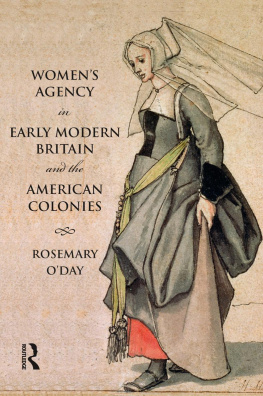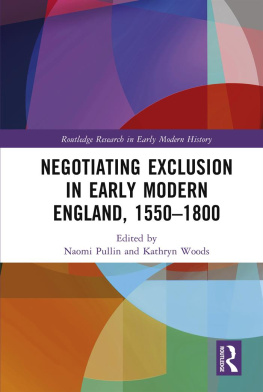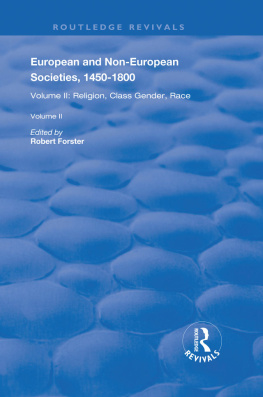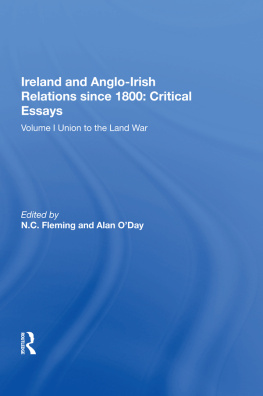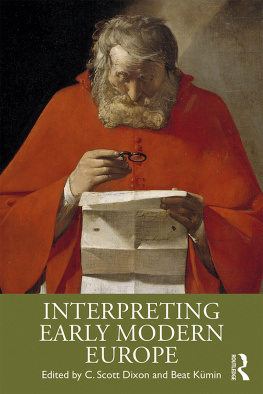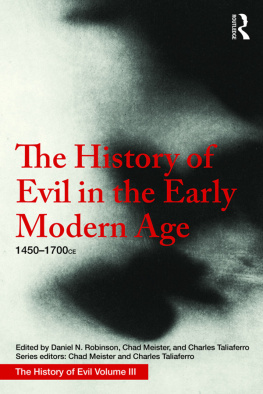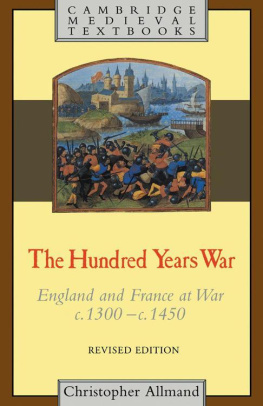THE PROFESSIONS IN EARLY MODERN ENGLAND, 14501800: SERVANTS OF THE COMMONWEAL
THEMES IN BRITISH SOCIAL HISTORY
This series covers the important aspects of British social history from the Renaissance to the present day. Tapics include education, poverty, health, religion, leisure, crime and popular protest, some of whirh are treated in more than one volume. The books are written for undergraduates, postgraduates and the general reader, and each volume combines a general approach to the subject with the primary research of the author.
Currently available
The English Family 14501700
Ralph A. Houlbrooke
Poverty and Policy in Tudor and Stuart England
Paul Slack
Crime in Early Modern England 15501750 (Second Edition)
J.A. Sharpe
Popular Cultures in England 15501750
Barry Reay
Gender in English Society, 16501850: The Emergence of Separate Spheres?
Robert Shoemaker
Popular Disturbances in England 17001832 (Second Edition)
John Stevenson
Literature and Society in Eighteenth-century England
W.A. Speck
Crime and Society in England 17501900 (Second Edition)
Clive Emsley
The Labouring Classes in Early Industrial England 17501850
John Rule
Land and Society in England 17501980
G.E. Mingay
Sex, Politics and Society: The Regulation of Sexualily since 1800 (Second Edition)
Jeffrey Weeks
The Working Class in Britain 18501939
John Benson
The Rise of the Consumer Society in Britain 18801980
John Benson
Health and Society in Twentieth-century Britain
Helen Jones
The English Town, 16801840
Rosemary Sweet
Newspapers, Politics and English Society, 16951855
Hannah Barker
THE PROFESSIONS IN EARLY MODERN ENGLAND, 14501800: SERVANTS OF THE COMMONWEAL
ROSEMARY ODAY
First published 2000 by Pearson Education Limited
Published 2014 by Routledge
2 Park Square, Milton Park, Abingdon, Oxon OX14 4RN
711 Third Avenue, New York, NY 10017, USA
Routledge is an imprint of the Taylor & Francis Group, an informa business
Pearson Education Limited 2000
The right of Rosemary ODay to be identified as author of this adapted Work has been asserted by her in accordance with the Copyright, Designs and Patents Act 1988.
All rights reserved. No part of this publication may be reproduced, stored in a retrieval system, or transmitted in any form or by any means, electronic, mechanical, photocopying, recording or otherwise, without either the prior written permission of the publisher or a licence permitting restricted copying in the United Kingdom issued by the Copyright Licensing Agency Ltd, 90 Tottenham Court Road, London W1P 0LP.
ISBN 978-0-582-29264-2 (pbk)
British Library Cataloguing-in-Publication Data
A catalogue record for this book can be obtained from the British Library
Library of Congress Cataloguing-in-Publication Data
Typeset by 35 in 11/ 13pt Baskerville
I dedicate this book to my youngest son, Matthew Englander, who loves history.
Countryman: wee teache them schoole learning, to know good from bad beeing growen to riper age, wee send them to the Universities, where many become so learned, as they gaine by learning their owne living: or, if not, yet such taste of learninge, as they are the better. Some also we bring up in ye Innes of Court, where if they profite, wee suffer them to proceed
Courtier and Townsmen: [but] all men are not apte for one thing, yet is it commendable, nay rather necessary, that there be persons prepared for sundry actions, not so much to serve their own turnes as their prince and countrey: respectes of more importaunce, then the safety of any private gentleman, either his person, his patrimony, or his parents in respecte of the common wealth, & the service thereof, (whereunto we are all bound, yea the best of us all)
(Anon, Cyvile and Uncyvile Life, 1586 edn.)
I would like to thank the editor of this series, Dr John Stevenson, both for his suggestion that I write this work in its present form and for his forbearance in waiting for it! I had already spent over 30 years thinking about the subject when I sat down to fulfil the commission and, in a sense, this made the book more difficult to write. The Woodrow Wilson International Center for Scholars, Washington, DC early in my career appointed me to a Fellowship, gave me the opportunity to work unhindered for a full year on this topic and provided me with the stimulating conversation of scholars addressing similar problems. I thank the Faculty of Arts Research Committee for financial and moral support while I was undertaking the research for the book. I am particularly grateful to Professor Gerald Aylmer, whose Special Subject at the University of York and whose work on the Kings and States Servants stimulated my interest in the subject initially; Professor Patrick Collinson, whose deep knowledge of Tudor and Stuart society has taught me humility; and Professor Kenneth Charlton, under whom I had the privilege to work at the University of Birmingham, whose perspective on the professions was so illuminating. Especial thanks also go to Mrs Valerie Humphrey, who worked so skilfully and so cheerfully with me to perfect the manuscript for the press.
The study draws upon my own research into the learned professions and inevitably upon a burgeoning academic literature. Only quotations have been given references in the text. Other referencing uses a list system. Modern readers could find puzzling the terminology used to describe some features of the professions. Early modern clergy, lawyers and doctors were often charged with using verbal mumbo-jumbo (what we would call jargon) to mystify laymen; scholars have added their own layer of impenetrable language. I have tried to use plain English where possible and have supplied a brief glossary on to explain technical terms, which are unavoidable in such a text.
Long ago Professor F.J. Fisher, my supervisor at the LSE, set my mind thinking about the work of the professions by asking in that characteristically penetrating way of his: What on earth did the clergy do all day? At that time I was concerned mainly with the development of the clergy, but some time afterwards I spent a very valuable year in Washington DC at the Woodrow Wilson Center concentrating on the learned professions in general and discussing the subject with a highly supportive group of scholars, which included Geoffrey Best, Bronislav Geremek, Gladys and Kurt Lang, Jack Pole and Paolo Prodi. Some of the resulting work was published in my book Education and Society, 15001800 and in article form. I am delighted to thank for their financial and academic support: the Woodrow Wilson International Center for Scholars, Washington, DC; the Folger Shakespeare Library, Washington DC; the Huntington Library, San Marino, California; the British Academy; the Faculty of Arts, The Open University, Milton Keynes; and the University of London. Along the way I have received marvellous support from, among others, the staff of the British Library; the Public Record Office; the Bodleian Library; the Cambridge University Library; the Library of Congress; the Institute of Historical Research; the Lichfield Joint Record Office; Stafford Country Record Office and the William Salt Library; Bedford County Record Office; Hereford Record Office; Northamptonshire Record Office; Norfolk and Norwich Record Office; Worcestershire Record Office; and the Guildhall Library, London.



